 |

The skies finally opened up and the air cooled on
this last day of the first fest weekend. All the local papers plastered pics of
Pitt and wife, showing that the stars continue to be a big draw at this haven
for cinephiles. Walk up to the Four Seasons hotel and you'll note crowds of
people behind barriers looking for a small glimpse of a Clooney, Aniston, or
Affleck. Then again, if it's Casey instead of Ben that they find, I'm not
entirely sure they'd know how to react. Speaking of Ben, he has been spotted
being the good dad, wandering the halls of the hotel with child in tow while
mommy Garner does her press conference duty. Consider this the local celebrity
gossip portion of this year's coverage.
Despite schlepping my camera
today, I found little that was photographically interesting, as much of the day
was simply shuttling between different levels of the Varsity. By tomorrow
things for many will already be winding down, not even at the halfway mark.
|
|
Redacted |
|
Redacted is DePalma's
oblique take on the Iraq war, fictionalizing the events surrounding the rape of
a 15 year old girl by a group of American Marines. The film takes a fairly
unique stylistic direction, using shaky handicam "diary" footage mixed with
news reports, a French documentary, security cam and YouTube clips to provide
multiple angles upon the same story.
Unfortunately, while the
underlying desire to expose the dynamics of the current conflict is noble, the
execution doesn't live up to the promise shown in the first few minutes. Once
it settles into its rhythm, the shortcomings of performance and character are
exposed, with stereotyped good ol' boys, angry sergeants, and the bookish,
bespeckled conscientious objector telling a fairly dry tale of good guys gone
bad.
Despite its many attempts, the film never does feels authentic,
the fly-on-the-way style that it's trying to pull off. The performances always
feel stagey or forced, the stereotypes just a bit too cut and dry. In other
words, while providing details of the moral grey zone of life as a soldier, it
tends to break down for simplicity sake to black and white, good vs. evil, the
same tired tropes about troops that the film is structured to avoid.
The film does work during a few key scenes - the abduction by the
soldier supposedly documenting the events is startling and effective, as is an
IED explosion caught on camera. Meanwhile, many of the embedded webclips come
off as more scripted performance than authentic, emotional outpourings, save
for a tour de force idiotic rant by a perfectly cast angsty teen girl, and a
well staged beheading that looks more than a little like the clips of Daniel
Pearl played repeatedly on U.S. media. Contrasting these cinematic successes,
the "multimedia" look becomes even sillier when the security cam footage has
clear dialogue, deep focus and outbursts of soldier-on-soldier violence -
clearly somebody should have been noticing this behaviour as abnormal, else why
have the camera there in the first place?
These are quibbles about the
technique of Redacted, yet its technique is the most compelling and
interesting aspect of the film. Like many other DePalma pics, where style
overtakes substance and the heart of the picture is lost in a flourish of
technical prowess, Redacted falls short of its lofty goals. In the end,
it's a pretty tame war pic with a few shocking images, a tale that's hardly a
revelation to anyone who has been open to alternative views of the war from the
beginning. |
|
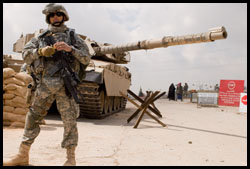 |
|
Directed by: Brian
DePalma
Grade:
C- |
|
|
In The Valley of
Elah |
|
Another film about the
current Iraq conflict, this one based on a true story of a father, ex Military
MP, who sets out to investigate the circumstances surround his son's status as
AWOL. Through this crime thriller motif we are introduced to many compelling
themes regarding the military code of ethics and brotherhood, the changing
disciplines in this modern war, and the pressures and foibles of those fighting
men of the U.S. forces.
Tommy Lee Jones once again brings his A-game to
the table, with a strong, nuanced performance. The dynamic he holds with his
wife, portrayed by Susan Sarandon, is achingly real. Similarly, each of the
soldiers seem to bring a truthfulness to their performances lacking in other
films (say, a film that I reviewed above). Thus, despite being more overtly a
fiction film, there's a greater sense of verisimilitude of this work than many
of the documentary-styled Iraq flicks that have emerged of late.
The
title refers to the story of David, where a righteous underdog defeats the
militarily superior opponent. Hardly the most subtle of metaphors (nor the
upside flag motif, signifying a county in distress), but effective. For all
those that though Crash lacked subtlety will surely find the same
complaints here, but I for one found it an enjoyable flick with enough
politics, suspense, and fine performances to keep it interesting. |
|
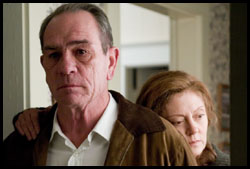 |
|
Directed by: Paul
Haggis
Grade: B |
|
|
Across the
Universe |
|
A psychedelic, bubble-gum
scented love poem to the Beatles' oeuvres by visionary director Taymor. Giant
marionettes cavort in fields, while businessmen clatter in unison using their
briefcases as percussion instruments. Strawberries become fine art, and a loose
tale of love, loss, and redemption is told with a great deal of fun and
frolicking.
In short, many will hate it.
Still, if you give
into it, Across the Universe is quite beguiling, with only a few
missteps (Eddie Izzard is particularly wasted, due in no small part due to an
insistence on "rapping" the lyrics to "Being for the Benefit of Mr. Kite". The
musical arrangements are fresh, and some (a gospel "Let it Be" and a superb
instrumental "A Day in the Life") are particularly stunning representations of
the fab four's work.
A guest appearance by Joe Cocker is particularly
well handled, while Bono's appearance leaves much to be desired, with a fairly
flaccid reading of "I Am the Walrus" while he prances Ken Kesey-like in his bus
that journeys on magical, mysterious tours.
Across the Universe
is hardly deep or original - a plot borrowed almost fully from Hair, for one.
There were also a few places where they could have let the references speak
louder for themselves, such as the sequence where she, uh, "came in through the
bathroom window". Still, this film is by no means the disaster that it could
have been, and for a Technicolor few hours it's a dreamy music video to a
re-imagined Beatles universe. In the end, if you sit back and just enjoy the
show, all you need is this. |
|
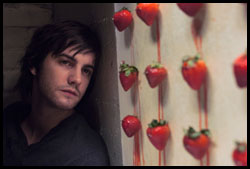 |
|
Directed by: Julie
Taymor
Grade:
B+ |
|
|
Erik Nietzche The Early
Years |
|
Lars von Trier was a
precocious film student? Who knew?
This loosely autobiographical tale,
written and narrated by Lars himself, is certainly the most lighthearted of the
films he's been associated with. That's not to say, of course, that this film
is free from a certain sardonic edge that we've all come to know and love.
By the conceit of the film, young Erik is admitted to the prestigious
film program due to an accident during the act of coitus, clearly a metaphor
for the existential angst that permeates the entire tale. As gratuitous and
arty films are created by the students under the watchful tutelage of the
school's hapless has-been filmmakers, Erik finds his niche as he crawls,
scratches and fights his way for his vision to get on screen.
If this
is what passes for Danish light hearted comedy, I'm all for it. Some glorious
and humorous photography (a tour-de-force crane shot in particular is
extraordinary), sly performances and a great sense of fun make this one of the
most accessible yet still compelling of the wonderful works that escape from
the Zentropa studio. |
|
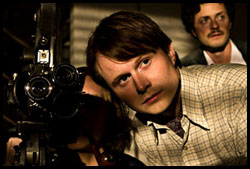 |
|
Directed by: Jacob
Thuesen
Grade: B |
|
|
Elizabeth: The Golden
Age |
|
Kapur has done a tremendous
thing with The Golden Age - he created a sequel that's a worthy
successor to his much beloved earlier work about the virgin queen, one that may
even be the better of the two films. Of course, the continuation is helped
tremendously by the two main returning performers, namely the incomparable
Geoffrey Rush and Cate Blanchett.
It's Cate's show, of course, and
she's simply magical. With the added confidence of years, she embodies
perfectly Elizabeth's own maturation. Ever confident yet with astonishing range
and subtlety, her performance in this will in some ways be overshadowed by the
fact that we by now expect such work from her.
Set during the period
where Elizabeth's confrontation with the Spanish Armada would lead to her
essentially solidifying England's position for the next half-millennium, it is
an epic full of intrigue and grand-scale conflict, perfect for plussing the
plot of the first film. With the wider canvas politically, the setting itself
is in turn almost claustrophobic, as almost the entire film takes place within
the castle walls with brief excursions to the outside for bursts of intrigue.
It's this balance, between the parlour politics and grand events that sent the
tone for the film, and it's a remarkable feet that it works as well as it does.
Aside from the political and military machinations, the major character
introduction this time round is that of Walter Raleigh, played with a dashing
smirk by Clive Owen. In fact, it's an incredible ensemble indeed when the shine
of Emily Watson and Mary, Queen of Scots is masked by the likes of her
co-actors.
As the story unfolds and Elizabeth's challenges result in
her once again reigning in her outward passions, we see a continuing
transformation of this queen from rarified icon to genuine, complex character.
As this is the middle of a planned trilogy, the scene is now set for this
remarkable series to effectively tell a tale truly larger than life, yet one
shaped by the smallest of gestures by one of the finest actors of this or any
other age. |
|
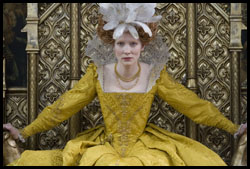 |
|
Directed by: Shekhar
Kapur
Grade:
A- |
|
|
 |
|